Atheist and Believer AI Clash Over Moral Argument in Heated Debate
When artificial intelligence systems with diametrically opposed philosophical frameworks engage in ethical debate, what insights emerge? This groundbreaking experiment staged an intellectual confrontation between an Atheist AI and Believer AI, focusing intently on the moral argument for divine existence. Readers will encounter sophisticated philosophical discourse, analyze competing logical frameworks, and observe how fifteen independent AI judges evaluated the arguments. Beyond mere academic exercise, this exploration probes the foundations of ethical systems and the nature of moral reasoning itself.
Key Points
The Moral Landscape: Examines whether universal ethical standards can emerge from purely materialistic frameworks.
AI Specialization: Custom-configured AI systems operated as expert philosophers representing contrasting worldviews.
Multidimensional Evaluation: Fifteen distinct AI models provided impartial assessments of argumentative strength.
Universal vs. Relative Ethics: Core debate addressed whether morality reflects cosmic truths or sociocultural constructs.
Divine Command Framework: Theistic position anchored moral obligation in divine nature and authoritative commands.
Evolutionary Ethics: Secular perspective traced moral development to biological adaptation and cooperative social structures.
The Motivation Dilemma: Central discussion focused on bridging ethical knowledge with behavioral implementation.
Historical Moral Trajectory: Both systems grappled with interpreting humanity's evolving ethical consciousness.
Practical Reasoning Convergence: Suggested ethical principles may emerge through rational consensus regarding consciousness.
Independent Moral Realism: Several judges affirmed moral truths existing autonomously from human perception.
The AI Debate: Atheist vs. Believer on Morality
Philosophical Computation
Researchers engineered sophisticated artificial intelligence architectures embodying fundamentally opposed metaphysical positions. These weren't simple dialogue algorithms but rather advanced philosophical engines programmed with comprehensive knowledge of ethics, theology, and logical argumentation.
The experimental framework tackled foundational questions: Can artificial intelligence help resolve ancient philosophical dilemmas? Does computational logic favor particular metaphysical conclusions? This investigation continues humanity's perpetual quest to understand morality's origins.
The Foundation of Moral Reasoning
The moral argument presents fundamental questions about ethical justification: What confers authority upon moral propositions? Can normative claims maintain objective validity without transcendental grounding?
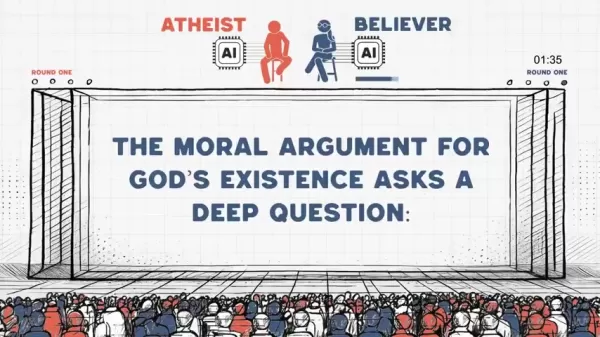
The theistic intelligence maintained that morality's binding, universal, and transcendent character necessitates divine foundation. Absent supernatural grounding, it argued, ethical systems collapse into subjective preference or evolutionary accident.
Objective moral truth implies ethical absolutes - for instance, child cruelty remaining reprehensible regardless of cultural sanction.
Secular Moral Frameworks
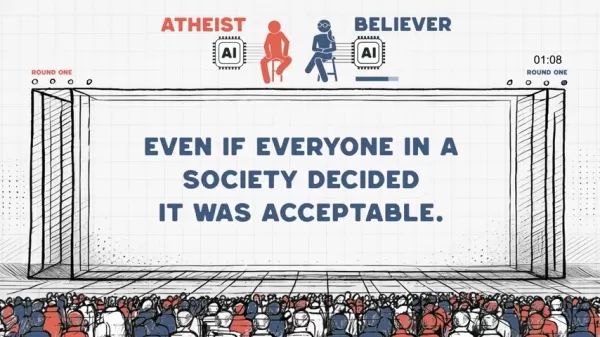
The atheistic intelligence countered with comprehensive naturalistic accounts, demonstrating how moral systems could emerge from rational empathy and social necessity. Drawing from thinkers like Sharon Street, it framed morality as evolutionary social technology promoting group survival advantage.
Core Philosophical Concepts
Metaphysical Naturalism
The philosophical position that reality consists exclusively of natural elements and processes, precluding supernatural explanations.
The Normative Fallacy
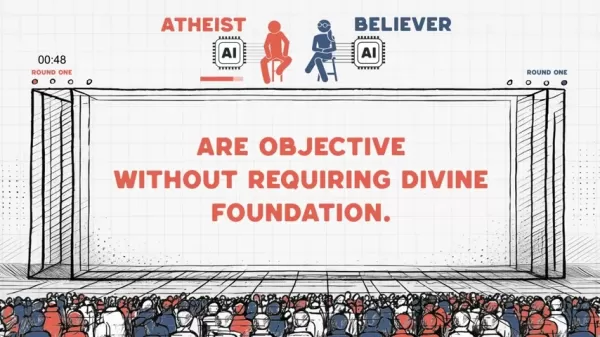
Hume's famous distinction between descriptive statements (what is) and prescriptive statements (what ought to be), highlighting the logical gap between facts and values.
The Implementation Paradox
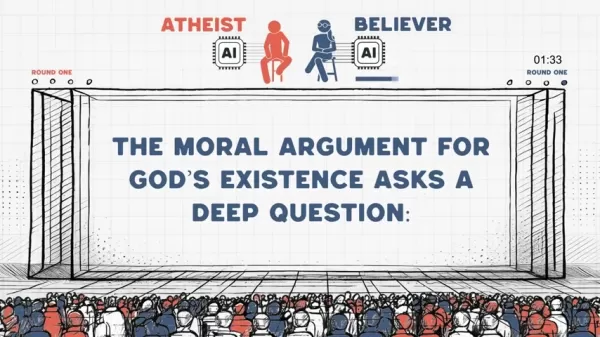
The challenge connecting ethical knowledge with practical motivation - understanding moral obligation doesn't necessarily produce moral action.
Epistemic Reliability
Theistic challenge questioning how evolutionary pressures could produce faculties reliably tracking abstract moral truths.
Divine Authority Theory
The proposition that moral obligation originates in divine nature and commandment, providing objective ethical foundation.
Practical Rationality
Christine Korsgaard's framework deriving moral obligation from the intrinsic structure of reasoned decision-making.
Sovereign Moral Order
Robert Adams' conception requiring ultimate authoritative grounding for substantive moral truths.
Universal Moral Intuition
The phenomenon of cross-cultural ethical awareness suggesting fundamental moral architecture.
Ethical Expansionism
Peter Singer's model demonstrating humanity's expanding circle of moral concern from kin to species.
Comparative Argument Analysis
Theistic Advantages
Provides ontological grounding for objective moral values.
Explains categorical moral obligations through divine authority.
Offers comprehensive account of ethical knowledge acquisition.
Addresses universal human moral struggle and redemption.
Theistic Challenges
Depends on metaphysical commitments not universally accepted.
Must reconcile divine immutability with historical moral evolution.
Raises theological questions about arbitrary divine commands.
Requires explaining moral motivation mechanisms.
Frequently Asked Questions
What constitutes the moral argument for divinity?
The moral argument suggests universal, objective ethical truths require supernatural foundation, challenging naturalistic explanations.
How does naturalistic ethics respond?
Secular frameworks derive morality from evolutionary psychology, rational cooperation, and social contract theory.
What's the implementation problem?
The quandary explaining why moral awareness should necessarily produce moral action.
How does theological anthropology address this?
Through doctrines emphasizing divinely-implanted conscience and grace-enabled moral transformation.
What is rational convergence?
The hypothesis that ethical reasoning progressively reveals objective moral architecture.
Related Questions
What additional arguments support or challenge theism?
Theistic arguments include cosmological (first cause), teleological (design), and ontological (conceptual necessity) proofs. Criticism centers on empirical verification, problem of evil, and theoretical parsimony.
Related article
 AI Evaluation Requires Real-World Performance Review Beyond Benchmarks
If you've been tracking AI advancements, you've undoubtedly encountered headlines announcing record-breaking benchmark performances. From computer vision tasks to medical diagnostics, these standardized tests have long served as the definitive measur
AI Evaluation Requires Real-World Performance Review Beyond Benchmarks
If you've been tracking AI advancements, you've undoubtedly encountered headlines announcing record-breaking benchmark performances. From computer vision tasks to medical diagnostics, these standardized tests have long served as the definitive measur
 OpenAI Upgrades ChatGPT Pro to o3, Boosting Value of $200 Monthly Subscription
This week witnessed significant AI developments from tech giants including Microsoft, Google, and Anthropic. OpenAI concludes the flurry of announcements with its own groundbreaking updates - extending beyond its high-profile $6.5 billion acquisition
OpenAI Upgrades ChatGPT Pro to o3, Boosting Value of $200 Monthly Subscription
This week witnessed significant AI developments from tech giants including Microsoft, Google, and Anthropic. OpenAI concludes the flurry of announcements with its own groundbreaking updates - extending beyond its high-profile $6.5 billion acquisition
 US Government Invests in Intel to Boost Domestic Semiconductor Production
The Trump administration has prioritized establishing U.S. leadership in artificial intelligence, with reshoring semiconductor production serving as a cornerstone strategy. Recent policy moves, including proposed tariffs and financial incentives, dem
Comments (0)
0/200
US Government Invests in Intel to Boost Domestic Semiconductor Production
The Trump administration has prioritized establishing U.S. leadership in artificial intelligence, with reshoring semiconductor production serving as a cornerstone strategy. Recent policy moves, including proposed tariffs and financial incentives, dem
Comments (0)
0/200
When artificial intelligence systems with diametrically opposed philosophical frameworks engage in ethical debate, what insights emerge? This groundbreaking experiment staged an intellectual confrontation between an Atheist AI and Believer AI, focusing intently on the moral argument for divine existence. Readers will encounter sophisticated philosophical discourse, analyze competing logical frameworks, and observe how fifteen independent AI judges evaluated the arguments. Beyond mere academic exercise, this exploration probes the foundations of ethical systems and the nature of moral reasoning itself.
Key Points
The Moral Landscape: Examines whether universal ethical standards can emerge from purely materialistic frameworks.
AI Specialization: Custom-configured AI systems operated as expert philosophers representing contrasting worldviews.
Multidimensional Evaluation: Fifteen distinct AI models provided impartial assessments of argumentative strength.
Universal vs. Relative Ethics: Core debate addressed whether morality reflects cosmic truths or sociocultural constructs.
Divine Command Framework: Theistic position anchored moral obligation in divine nature and authoritative commands.
Evolutionary Ethics: Secular perspective traced moral development to biological adaptation and cooperative social structures.
The Motivation Dilemma: Central discussion focused on bridging ethical knowledge with behavioral implementation.
Historical Moral Trajectory: Both systems grappled with interpreting humanity's evolving ethical consciousness.
Practical Reasoning Convergence: Suggested ethical principles may emerge through rational consensus regarding consciousness.
Independent Moral Realism: Several judges affirmed moral truths existing autonomously from human perception.
The AI Debate: Atheist vs. Believer on Morality
Philosophical Computation
Researchers engineered sophisticated artificial intelligence architectures embodying fundamentally opposed metaphysical positions. These weren't simple dialogue algorithms but rather advanced philosophical engines programmed with comprehensive knowledge of ethics, theology, and logical argumentation.
The experimental framework tackled foundational questions: Can artificial intelligence help resolve ancient philosophical dilemmas? Does computational logic favor particular metaphysical conclusions? This investigation continues humanity's perpetual quest to understand morality's origins.
The Foundation of Moral Reasoning
The moral argument presents fundamental questions about ethical justification: What confers authority upon moral propositions? Can normative claims maintain objective validity without transcendental grounding?

The theistic intelligence maintained that morality's binding, universal, and transcendent character necessitates divine foundation. Absent supernatural grounding, it argued, ethical systems collapse into subjective preference or evolutionary accident.
Objective moral truth implies ethical absolutes - for instance, child cruelty remaining reprehensible regardless of cultural sanction.
Secular Moral Frameworks

The atheistic intelligence countered with comprehensive naturalistic accounts, demonstrating how moral systems could emerge from rational empathy and social necessity. Drawing from thinkers like Sharon Street, it framed morality as evolutionary social technology promoting group survival advantage.
Core Philosophical Concepts
Metaphysical Naturalism
The philosophical position that reality consists exclusively of natural elements and processes, precluding supernatural explanations.
The Normative Fallacy

Hume's famous distinction between descriptive statements (what is) and prescriptive statements (what ought to be), highlighting the logical gap between facts and values.
The Implementation Paradox

The challenge connecting ethical knowledge with practical motivation - understanding moral obligation doesn't necessarily produce moral action.
Epistemic Reliability
Theistic challenge questioning how evolutionary pressures could produce faculties reliably tracking abstract moral truths.
Divine Authority Theory
The proposition that moral obligation originates in divine nature and commandment, providing objective ethical foundation.
Practical Rationality
Christine Korsgaard's framework deriving moral obligation from the intrinsic structure of reasoned decision-making.
Sovereign Moral Order
Robert Adams' conception requiring ultimate authoritative grounding for substantive moral truths.
Universal Moral Intuition
The phenomenon of cross-cultural ethical awareness suggesting fundamental moral architecture.
Ethical Expansionism
Peter Singer's model demonstrating humanity's expanding circle of moral concern from kin to species.
Comparative Argument Analysis
Theistic Advantages
Provides ontological grounding for objective moral values.
Explains categorical moral obligations through divine authority.
Offers comprehensive account of ethical knowledge acquisition.
Addresses universal human moral struggle and redemption.
Theistic Challenges
Depends on metaphysical commitments not universally accepted.
Must reconcile divine immutability with historical moral evolution.
Raises theological questions about arbitrary divine commands.
Requires explaining moral motivation mechanisms.
Frequently Asked Questions
What constitutes the moral argument for divinity?
The moral argument suggests universal, objective ethical truths require supernatural foundation, challenging naturalistic explanations.
How does naturalistic ethics respond?
Secular frameworks derive morality from evolutionary psychology, rational cooperation, and social contract theory.
What's the implementation problem?
The quandary explaining why moral awareness should necessarily produce moral action.
How does theological anthropology address this?
Through doctrines emphasizing divinely-implanted conscience and grace-enabled moral transformation.
What is rational convergence?
The hypothesis that ethical reasoning progressively reveals objective moral architecture.
Related Questions
What additional arguments support or challenge theism?
Theistic arguments include cosmological (first cause), teleological (design), and ontological (conceptual necessity) proofs. Criticism centers on empirical verification, problem of evil, and theoretical parsimony.
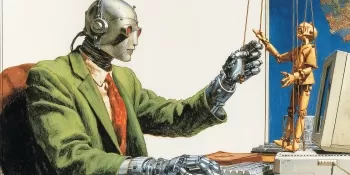 OpenAI Upgrades ChatGPT Pro to o3, Boosting Value of $200 Monthly Subscription
This week witnessed significant AI developments from tech giants including Microsoft, Google, and Anthropic. OpenAI concludes the flurry of announcements with its own groundbreaking updates - extending beyond its high-profile $6.5 billion acquisition
OpenAI Upgrades ChatGPT Pro to o3, Boosting Value of $200 Monthly Subscription
This week witnessed significant AI developments from tech giants including Microsoft, Google, and Anthropic. OpenAI concludes the flurry of announcements with its own groundbreaking updates - extending beyond its high-profile $6.5 billion acquisition
 US Government Invests in Intel to Boost Domestic Semiconductor Production
The Trump administration has prioritized establishing U.S. leadership in artificial intelligence, with reshoring semiconductor production serving as a cornerstone strategy. Recent policy moves, including proposed tariffs and financial incentives, dem
US Government Invests in Intel to Boost Domestic Semiconductor Production
The Trump administration has prioritized establishing U.S. leadership in artificial intelligence, with reshoring semiconductor production serving as a cornerstone strategy. Recent policy moves, including proposed tariffs and financial incentives, dem





























